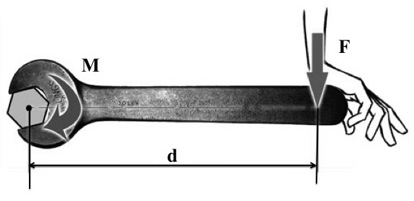A measure of the turning effect or torque produced by a force acting on a body. Its magnitude is the product of the force and the perpendicular distance from the axis of rotation to the line of action of the force about which the body will turn (referred to as a point or pivot). The turning force around the pivot is the moment, with its unit of measurement being newtons meter (Nm). The moment of force complies with the following formula:
Moment (M) = force (F) newtons x perpendicular distance (d) meter
The application of this formula can be illustrated the working of spanner (see figure below). The only difference between moment and torque, which both are turning effects and measured in Nm, is that moment refers to static situations (e.g., a lever) and torque to dynamic situations (e.g., a motor shaft). According to convention, clockwise moments are positive and anti-clockwise ones negative.
